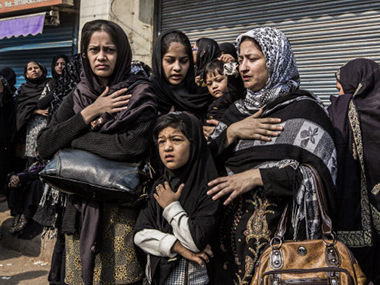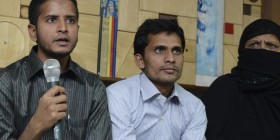At the peak of World War II, the British and the Germans faced a severe shortage of men to work in the factories because many of them were recruited for fighting.
The British found a simple solution to the problem: they recruited more women to run their factories and take care of non-combat jobs. But the Nazis kept their women at home, believing that their only job was procreation and only responsibilities were motherhood and housekeeping.
The Nazis paid a huge price for their patriarchal and conservative approach towards women. The British soon caught up with them and started producing more material for their troops in spite of the Nazis having an early start.
Numerous other instances from history reveal how countries, civilisations and cultures suffered by treating half of their population as second-rate citizens. But, the lessons from history have not been learnt, especially by the Islamic world.
So, when the vice-chancellor of Aligarh Muslim University, Lt Gen (retd) Zameer Uddin Shah, says Muslims lagged behind in the development race because they kept their women enslaved, it is yet another call for introspection for the community.
“You have not utilised half of your population. Women remained enslaved. They remained inside home. Muslims have no one else to blame. You enslaved women and the result is you are enslaved,” Shah said during a felicitation function of AMU Old Boys at Lucknow on Sunday.
“I stayed in Saudi Arabia, the situation remains the same. Women are confined. Except Turkey and Iran, women remained enslaved in all Muslim world. That is the reason they are backward,” he added.
Shah is a liberal, well-travelled and an educated Muslim. But, it doesn’t require his calibre of erudition to state the obvious: Muslim women remain uneducated, illiterate and under-utilised in many countries.
They labour at home from behind the veil of poverty, ignorance and inequality and contribute very little outside their home.
Education and Muslims have historically shared an uneasy relation. Under the Ottoman Turks, even at the beginning of the 18th Century the literacy levels among Muslims were just around a percent. Historian Donald Quataeart noted a literacy rate of 2-3 percent at the start of the 19th century and perhaps just 15 per cent at its end.
Even today, out of the 1.4 billion Muslims, 800 million are illiterate. While the global literacy rate has risen to almost 84 percent, six out of every ten Muslims, who are around 22 percent of world population, can’t even read.
What chance then do Muslim women have in this bleak scenario? Even in India, where the number of schools, colleges and universities is much higher than anywhere in the Arab world, only 41 percent of Muslim women were literate, according to the 2001 Census. Compared to non-Muslim women, the figure was 15 percent less.
To blame local factors — lack of resources, access to education, poverty etc — would be misleading, simply because it is a world-wide trend, manifest even in developed counties.
Obviously, culture and religion have something to do with it.
This is ironic because the Quran encourages learning. “Read in the name of your Lord who created, created man from a clinging form. Read! Your Lord is the Most Generous, who taught by means of the pen; taught man what he did not know. (96:1-5)”
And Prophet Mohammed’s own house had independent, enterprising and scholarly women. By many account’s his first wife Khadija bint Khuwaylid was the richest woman in Mecca, who employed several men in her business. His youngest wife Aisha Binte Abu Bakr was also a scholar. She is believed to have such a great memory that she narrated several thousand Hadith.
Obviously, the Quran emphasised on education and equality of women. It is for the intellectuals and reformists to find out what went wrong over the ages and lead to the current plight of Muslim women as illiterate, oppressed, second-rate citizens. Such is the complex web of problems that many Muslims do not want to get their girls educated simply because they are afraid of not finding equally educated grooms for them.
Cultural and religious barriers have been raised against women in various countries and civilisations. In India, they were not allowed to read Vedic literature, compared with drums, animals, Dalits and illiterates worthy of beating in religious texts, forced to die on the funeral pyres of their husbands and stopped from remarrying on becoming widows. But reforms from within gradually led to improvement.
Shah is not the first person to advocate self-analysis, introspection and reforms among Muslims. Many Muslim intellectuals have been brutal in their assessment of their community and its failures. Mohammed Iqbal had famously written, albeit in a different context:
Mohabbat ka junoon baqi nahin hai,
Musalmanon mein khun baqi nahin hai;
Ragon mein lahu baqi nahin hai
Wo dil, wo awaz baqi nahin hai;
Namaz-o-roza-o-qurbani-o-Haj,
Ye sab baqi hai, tu (God) baqi nahin hai.
Unless the Muslims listen to progressive voices and people like Shah and respond to calls for changes, much of what Iqbal lamented will continue to remain true even after centuries.





Leave a reply